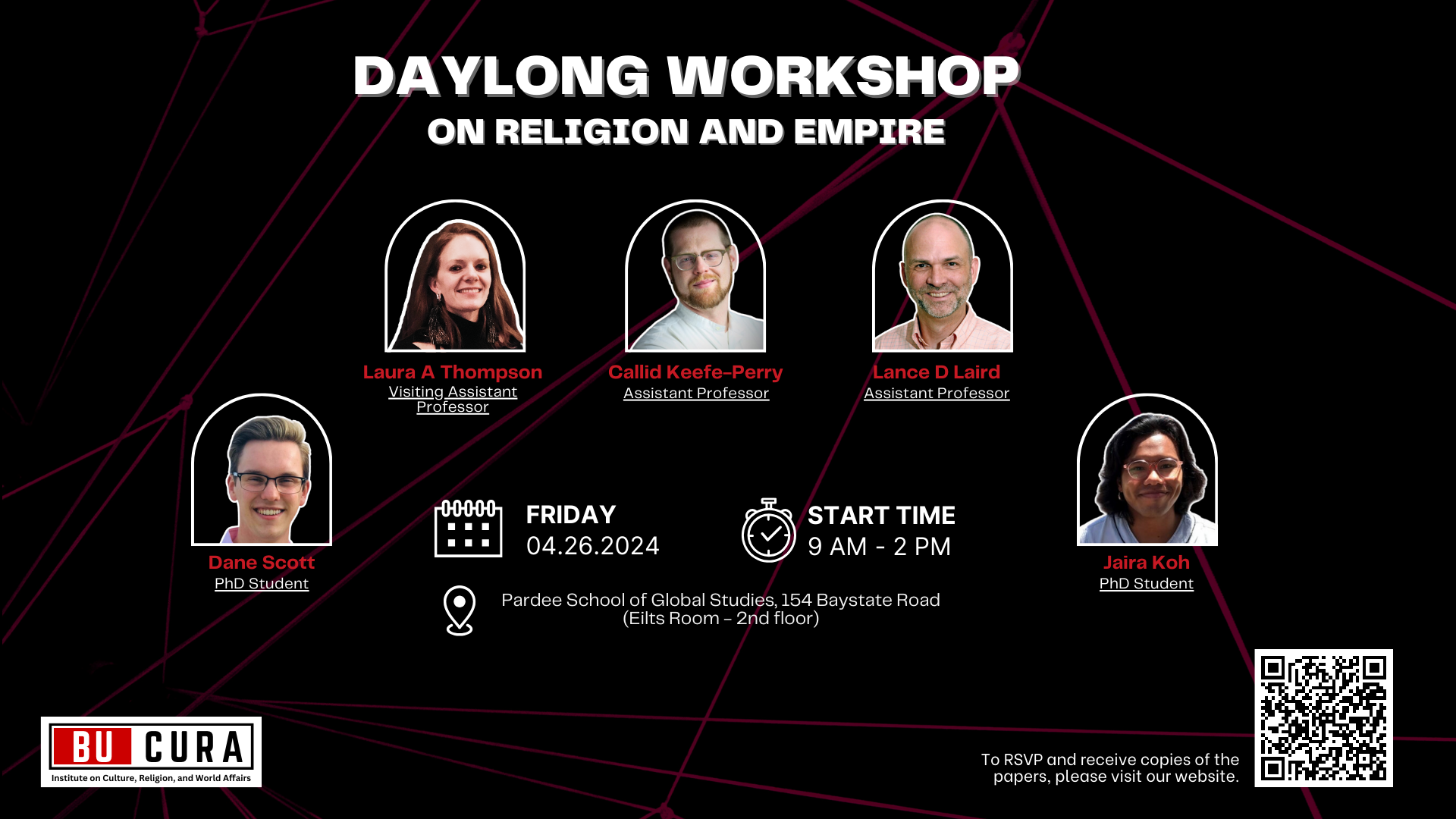Daylong Workshop on Religion and Empire

|
The Schedule
|
| Time | Activity | Title |
|---|---|---|
| 9:00 – 9:50 | Dane Scott | Chaining God: Theorizing Bound Cult Images in Mediterranean Antiquity |
| 9:50 – 10:40 | Callid Keefe-Perry | Altars of Empire: U.S. Christian Nationalism and the Performance of Power |
| 10:40 – 11:30 | Lance D. Laird | Islamic Liberation Theology as the Empire Strikes Back: Palestinian Resistance Amid the Ruins of Gaza |
| 11:30 – 12:00 | Lunch Break (lunch will be provided) | Break |
| 12:00 – 12:50 | Laura Thompson | Sabb al-Jalāla: Insulting the Majesty of God in Contemporary Tunisian Courtrooms |
| 1:00 – 1:50 | Jaira Koh | Towards a Mutual Critique of Utopianisms: Liberation Theology in Dialogue with Social Reproduction Theory |
|
Registration Form
|
|
Our Speakers
|
 |
Laura A ThompsonVisiting Assistant Professor, Boston UniversitySabb al-Jalāla: Insulting the Majesty of God in Contemporary Tunisian Courtrooms Abstract: This paper ethnographically examines the contemporary prosecution of routine, low-level blasphemy prosecutions, called “sabb al-jalāla” (or “insulting the majesty [of God]”), in contemporary Tunisia. Broadly, the paper argues that the prosecution of sabb al-jalāla constitutes the legal reshaping of a garden-variety insult into a blasphemous, prosecutable offense. To do so, state actors engage in an intentional confusion of categories, taking a widespread insult in Tunisia Arabic as denotationally true. This paper proposes that different state actors engage in this “as if” behavior for two reasons: first, in order to punish those who have insulted them (and by extension, the state they represent), and second, in order to perform and uphold their location in a classed state hierarchy. |
Callid Keefe-PerryAssistant Professor of Contextual Education and Public Theology, Boston College School of Theology and MinistryAltars of Empire: U.S. Christian Nationalism and the Performance of Power Abstract: This article pursues two objectives. First, it aims to develop a more robust and interdisciplinarily-influenced theological account of empire, conceptualizing it as a system that erects altars to power. Second, it seeks to apply that account to the analysis and assessment of White Christian Nationalism as a manifestation of empire within the U.S. context. The theological category of “empire” is often under-theorized and used in reductionistic and oversimplified ways, serving as a stand-in for something akin to “an evil system.” This approach lacks historical nuance and misses the opportunity for a more insightful framing that recognizes empire’s allure and its ability to command devotion. To develop a more sophisticated theology of empire, this piece draws on political, historical, and sociological literature to buttress, contextualize, and critique existing theological and biblical interpretations. With a more complex lens in place, the article considers the explanatory utility of empire as a useful metaphor for theorizing the nature and effect of White Christian Nationalism in the U.S., framing it as a system that builds altars to its own power and demands allegiance. It distinguishes between those who primarily feel part of a Christian nationalist movement, worshipping at its altars, and those who seek to exploit the movement for personal gain, operating as priests of the empire. The article argues that an affective, missionary drive fuels the “machine” of White Christian Nationalism, but the operators of that vehicle are rarely the “missionaries” themselves. Ultimately, the article claims that Christian nationalism in the U.S. not only shapes national discourse but also reinforces and perpetuates a particular hierarchy of power resonant with historical manifestations of empire. White Christian Nationalism facilitates a performance of power embedded in American cultural and political institutions, with its own sacred rituals and sites of veneration. |
 |
 |
Lance D. LairdAssistant Professor of Family Medicine, Boston University Chobanian & Avedisian School of MedicineIslamic Liberation Theology as the Empire Strikes Back: Palestinian Resistance Amid the Ruins of Gaza Abstract: Drawing on formulations of Islamic liberation theology by Hamid Dabashi and Farid Esack in the contexts of Iran and South Africa, respectively; this paper will examine Islamic theo-political responses to Israeli settler colonialism as an extension of American empire. The paper will focus particular attention to theological underpinnings of American and diasporic Palestinian Muslim responses to the most recent conflict in Gaza and interpretations of Palestinian nationalist resistance. |
Dane ScottPhD Student, Department of ReligionChaining God: Theorizing Bound Cult Images in Mediterranean Antiquity Abstract: Following the devastating fire that ravaged Rome and left a substantial portion of the city in ruins in 64 CE, Tacitus writes that the Roman elite immediately sought to appease the perceived anger of the gods. Consulting the prophetic Sibylline Books, the priests of the Capitoline temple ritually bathed the cult image of the goddess Juno in hopes that the goddess would not desert the city (Tacitus Annales, 15.44). Though a relatively common practice in the goddess’s cult activity, this particular ritualized bath speaks to a larger phenomenon in Greco-Roman ritual practice: the ad hoc ritual manipulation of cult images in times of particular crisis. This paper will explore this phenomenon, examining the instances of images that were bathed, chained, or otherwise manipulated in response to crisis situations. I propose that these ritual interactions sought not only to instantiate the presence of the deity within the image (and thus assure the deity’s protection over the community) but also served as a strategy for mitigating fears surrounding pollution and danger. Drawing on literary attestations of bound and bathed cult images in authors like Pausanias, Athenaeus, as well as iconographic evidence, my paper examines these ad hoc interactions in terms of larger questions surrounding divine bodies and social forces: How did the ritual manipulation of cult images serve as an effective crisis response? Ultimately, this paper aims to broaden our understanding of the social and material agencies of the cult images in Greco-Roman society. These images were not merely a means for accessing divine presence; instead, the cult image embodied a nexus of social and divine forces. |
 |
 |
Jaira KohPhD Student, School of TheologyTowards a Mutual Critique of Utopianisms: Liberation Theology in Dialogue with Social Reproduction Theory Abstract: This paper begins to explore the potential for and of a mutual, loving critique between the utopianisms of Liberation Theology, and the utopias of social reproduction theory of the Marxist-Feminists and in particular their queer and transgender Marxism “descendants.” The discourse on utopianism that is in, and is, Liberation Theology as theorised in Latin America is multiple and varied, and offers a fruitful methodological tool for reopening the categories of utopia and the utopian as theorised by the Marxist-Feminists, to unsettle the overdetermination of those categories there by the orthodox Marxist critique of the “Utopian Socialists.” Feminist/Queer/Transgender Marxist social reproduction theory, on the other hand, offers to Liberation Theology a critical lens for reading the utopianism of their own orientations to the Christ figure otherwise, as a discourse on the reproduction of the category human as a revolutionary matter. Such an approach would train theological attention upon not only the symbolic processes of remaking the “human” so as to now accommodate the divine within it in the incarnation, but upon the material processes of socially reproducing that human Christ. The theological scope of this paper limits itself to the utopianism(s) of Rubem Alves in his texts A Theology of Human Hope and Tomorrow’s Child, whose utopianisms I deploy to stretch the utopianism of Marxist social reproduction theory, and whose whose treatment of the incarnation, reproduction, and pleasure I then subject to the critique of such a stretched theory of social reproduction. In particular, I use social reproduction theory to unearth and heighten the contradictions internal to Alves’ two texts – and internal to each text as well – interrogating the ways that Alves’ politics of pleasure cohabitates with his productivist politics, in search of what Alves’ liberation theology might become if the relationship between pleasure and the productivity might be understood in more utopian, gestational terms, as family-abolitionist Sophie Lewis poses it: if pregnancy were liberated to be no more than the “the most extreme of extreme sports” (Sophie Lewis, “Full Family Now). |